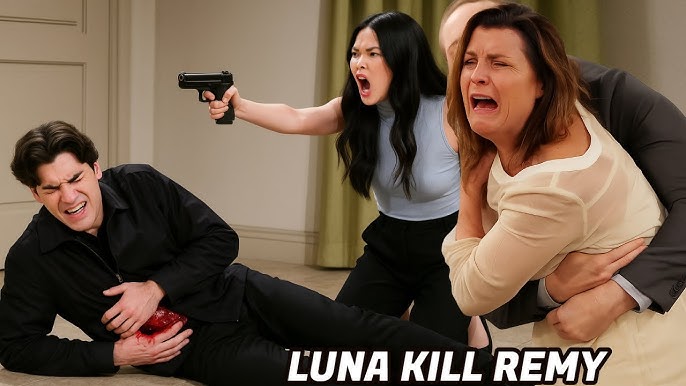In the latest shocking turn on Bold and the Beautiful, Remy Price faces a moral crossroads that will define his character forever. After weeks of chaos and deception, Remy finally corners Luna Nozzawa, the woman whose schemes have left a trail of panic and heartbreak across Los Angeles. For weeks, Luna had manipulated Will Spencer Jr., flipping the narrative to blackmail him, while making him question everything he thought he knew about her supposed death. Her threats to reveal incriminating secrets have left Will trapped, caught between protecting his reputation and confessing the truth to Electra Forester, his girlfriend.
Will’s investigation intensifies this week when he traces a mysterious IP address, with the help of his older brother Liam, back to Lee Finnegan’s apartment. The discovery shocks both Spencer brothers as it confirms Luna is alive. Will’s disbelief is compounded by guilt over his past actions: he had a liaison with Luna, mistakenly believing she was no longer alive, and then quickly resumed a relationship with Electra, who would likely never forgive the betrayal. As the week progresses, Luna’s plan to remain hidden at Remy’s residence begins to crumble, and confrontation becomes inevitable.
Meanwhile, the fallout from Luna’s return triggers a series of explosive encounters. Katie Logan lashes out at Luna for manipulating her son, while Lee Finnegan nearly strangles Luna in a fit of rage over the chaos she caused. Bill Spencer is similarly enraged, struggling to process the revelation that Luna survived. Remy, caught in the middle, experiences a mixture of shock, fear, and responsibility. When Luna unexpectedly shows up at his unlocked apartment seeking refuge, Remy realizes he must make a choice—one that balances justice, personal safety, and moral integrity.
Rather than taking matters into his own hands, Remy calls the police, understanding that true courage is restraint. This decision emphasizes his growth, highlighting the difference between revenge and justice, and reinforces the broader lesson that integrity is often exercised quietly, away from the limelight. The police’s imminent arrival ensures that Luna will face consequences, but also preserves Remy’s own ethical standing. His choice resonates deeply, symbolizing the quiet but powerful impact one person can have when choosing the right path over the tempting ease of vigilantism.
Meanwhile, Will Spencer faces his own reckoning. Luna Nozzawa confronts him directly, revealing a devastating truth: a prized artifact, the Kylex, which Will had publicly displayed as a $20 million ancient treasure, is a forgery. The base may be genuinely ancient, but the bowl itself is a modern reproduction, a fact carefully documented by Luna. The revelation threatens to destroy Will’s social and professional standing, leaving him vulnerable to public humiliation, legal ramifications, and financial fallout. For the first time, the man accustomed to controlling every room he enters is powerless.
But Luna’s confrontation is not about personal gain. Instead, she leverages the truth to demand systemic change: Will must reinstate the employees he unjustly terminated, implement an ethical oversight committee, and halt the controversial Clearwater acquisition. In doing so, Luna uses his vulnerability not to enrich herself, but to force accountability, turning his hubris into a tool for reform. Will’s usual confidence crumbles as he recognizes that Luna has effectively flipped the script: the one he believed powerless is now the one holding the ultimate leverage.
The tension extends to family dynamics as well. Katie and Bill, still reeling from their own grief and the lingering trauma of Luna’s apparent death, are forced to confront the reality of her survival. Their marriage, once strong, is revealed as fragile, a shared tragedy compounded by years of unspoken resentment and sorrow. The arrival of Remy, Luna’s godfather and relentless seeker of truth, brings further emotional weight. Having pursued countless false leads over the years, Remy is finally presented with undeniable proof that Luna is alive, a revelation that shakes him to his core and rekindles both hope and anguish.
As Remy navigates the complex moral landscape, he embodies the show’s central theme: the courage to do what is right, even when it is the hardest path. By contacting the authorities instead of exacting personal revenge, he ensures justice will be served while safeguarding innocent lives. At the same time, Luna’s confrontation with Will underscores a subtler, intellectual drama: true power can come not from wealth or status, but from the ability to wield truth strategically and ethically.
In this week’s episodes, Bold and the Beautiful demonstrates that morality, justice, and accountability are often intertwined in unexpected ways. Remy catches Luna physically, but he also grasps the deeper lesson of responsibility. Will faces ruin unless he embraces accountability, and Luna, the unlikely arbiter, becomes a catalyst for justice, proving that sometimes the quiet, overlooked figure can orchestrate the most dramatic transformation.



